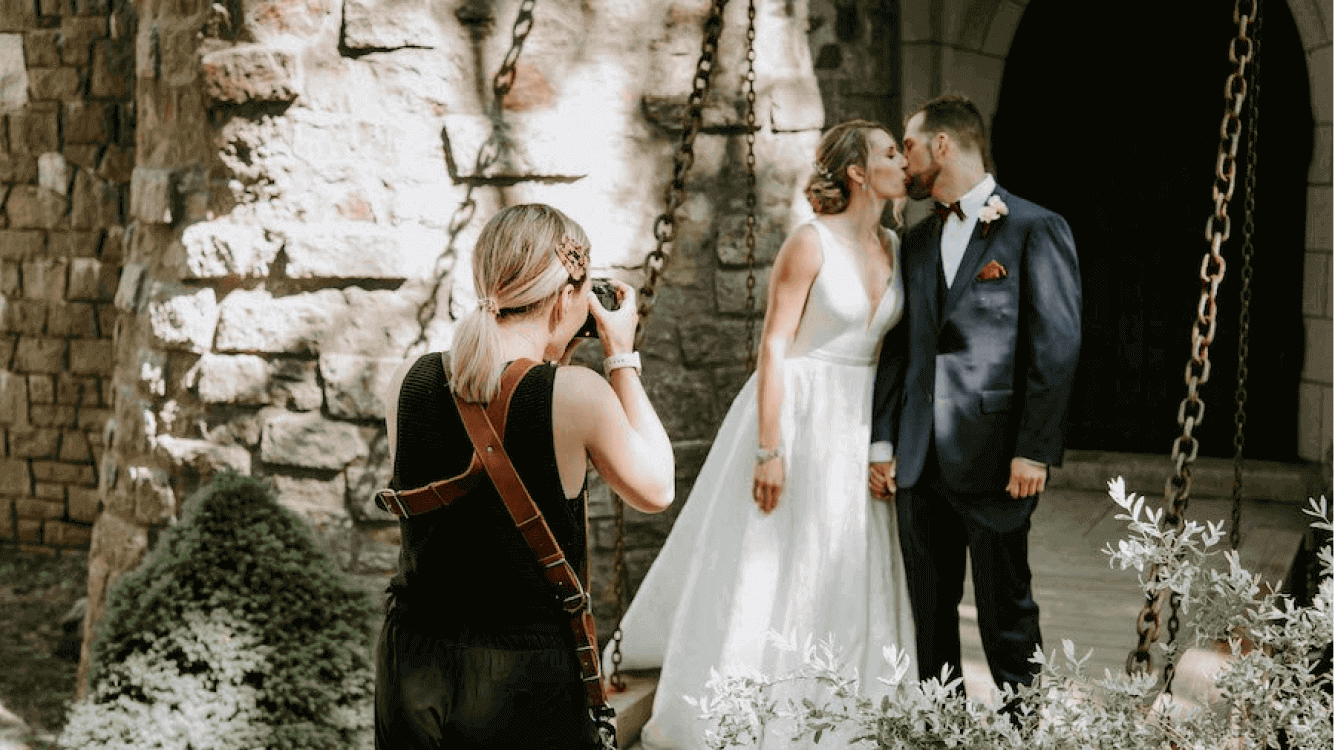5 Tips On How to Start a Wedding Photography Business
If you’re reading this, huge congratulations are in order! Thinking about launching a business is a big step and we’re excited to play our small part in helping you discover how to start a wedding photography business.

Starting a photography business is an exciting prospect but also requires careful planning and preparation. Our goal is to help set you up for success so you can start booking clients and doing what you love – capturing beautiful wedding memories!
With this expanded photography business checklist, we're dishing out five essential tips to help you lay the foundation for a booming wedding photography business.
By researching the market, honing your skills, curating a portfolio, pricing correctly, and getting your legal ducks in a row, you'll kickstart your business on the right foot.
1. Do Your Research
Oh, you thought homework was just for school? Think again!
Doing your homework is a crucial step in starting a photography business. Thorough market research involves studying your local market to determine demand, looking at pricing trends, and analyzing the competition.
Competitor analysis is possibly the most important research step when you’re thinking about how to start a wedding photography business.
You'll want to closely study other successful wedding photographers in your area. Analyze what they offer, their pricing and packages, their branding and marketing strategies.
This analysis will help you:
- Identify gaps in the market
- Find opportunities to differentiate yourself
- Gain inspiration on establishing your own unique brand identity

The key is to use your market research to determine how to stand out.
Discover what sets you apart and makes you unique compared to other wedding photographers in your area. Then showcase that distinct perspective or style across your brand image and portfolio.
During this research phase, it’s also important to identify the wedding photography educators and styles you most admire.
Study wedding photographers with the aesthetic that inspires your own work. Follow photographers with similar styles on social media and learn their techniques through online courses, workshops, or mentoring programs.
2. Hone Your Skills & Master Your Equipment
You've got the passion; now it’s time to fine-tune those skills and gear up! Photography is an art, so master those techniques to become a true maestro before launching your business.

Master Your Photography Techniques
Don't underestimate the importance of practice and developing expertise in areas like lighting, posing, and composition.
Tip 1: Consider investing in educational wedding photography courses and books to keep improving.
Tip 2: One of the best ways to get hands-on experience is to start as an assistant. Do your homework and reach out to local established wedding photographers that you most admire and whose style is closest to yours.
This is a great way to see how a typical wedding day flows and start learning what will be expected of you when you’re ready to become a second.
Tip 3: Be prepared to show examples of past work or even shoot as a third shooter a couple of times at a lower rate so they can get to know you and your style before giving you more trust and responsibility.
If you can help in that way, you’ll get loads of great experience and learn tonnes about running a business and how to manage a wedding day as a lead.
Tip 4: Other suggestions for honing your skills include starting with small weddings, vow renewals and engagement sessions.
These will help build a portfolio (more on that later).
Potential wedding clients will want to see examples of wedding-related photos. They want to be able to visualize themselves in those photos, and they won’t be able to do that if your portfolio only contains landscapes, children’s studio portraits and other photos that don’t have anything to do with the wedding they’re planning.
Tip 5: Ask your friends to pose for you (they don’t have to actually get married) to practice in different lighting scenarios or to find poses that reflect that romantic scene you’re looking to capture.
Refine your photographic style so you can deliver outstanding results. The moral of the story is to shoot as often as you can, even if it's just for fun or practice.
Commit to Continuous Learning
The photography world evolves fast, and you want to ride the wave.
Stay updated on the latest trends, techniques, and gear. Immerse yourself in photography blogs, YouTube tutorials, workshops, and webinars.
Remain open-minded and don't be afraid to try new approaches. Continuous improvement is key.

Invest in High-quality Equipment
Research and invest in professional camera bodies, lenses, lighting, and accessories suited for wedding photography.
And please, don't forget the backup equipment. Imagine a camera malfunction during the first dance – disaster! So, practice, learn, and equip yourself for those picture-perfect moments.
Don't cut corners in your preparation. By mastering your skills, embracing continuous learning, and equipping yourself with quality gear, you'll be able to deliver exceptional work for your clients when you launch your wedding photography business.

3. Build Your Portfolio
A strong portfolio is the crown jewel for anyone who's starting a photography business.
Your portfolio will be one of the main deciding factors for potential clients when choosing a wedding photographer. It shows your style, skills, and experience.

Identify the specific techniques and visual style that set you apart from other photographers. This will attract clients who love your particular approach to wedding photography.
Showcase your versatility with a diverse range of shots – weddings, engagements, portraits, details, candids, you name it. Let your portfolio scream, "I can handle it all!"
Highlight your unique style – that's your secret sauce. Whether it's capturing emotions in a photojournalistic style or creating dreamy, fairytale vibes, make sure your portfolio reflects that.
And hey, if you haven’t shot that many weddings and your portfolio needs a little boost, get creative! Snap pics of friends or offer discounts to early clients – it's an investment in your future success.
Building a solid wedding photography portfolio does take time and effort but the payoff of having a stand-out portfolio that lands clients will make all the effort worthwhile.
4. Get Your Pricing Right
Pricing – the unsung hero of a successful wedding photography business… and yet, it can feel like your absolute nemesis when you’re just starting a photography business.

Finding the perfect balance between what you’re worth and what your clients are willing to pay is key.
Don't underprice – it's a disservice to your skills and makes it very difficult to turn a profit.
Don't overprice – you’ll run the risk of pricing yourself out of the market, especially when you're just starting a photography business and don't have an established reputation yet.
Here are some tips to help you determine the right pricing for your wedding photography business:
- Do a cost analysis – Add up all your expenses (your cost of equipment, software, insurance, transportation, editing time, etc.) This gives you an idea of your overhead costs.
- Research your competition's pricing – Get a sense of the average rate for wedding photographers in your area with a similar skill level and experience. You can charge a competitive rate while still keeping your pricing aligned with your specific expenses and profit goals.
- Break down your packages – Determine what's included, the number of photographers, hours of coverage, and products delivered. Factor in your costs for each aspect.
- Offer value-added services – Providing albums, photo books, prints, etc. allows you to earn higher revenues. But make sure you calculate those production costs as well.
- Re-evaluate regularly – As you gain experience and notoriety, you can increase your rates accordingly. Review your pricing annually to take rising expenses and your growing expertise into consideration.
Read our Photography Pricing Guide to dive deeper into how you should determine the right pricing when starting a photography business.
5. Sort Out the Legalities
Legalities might seem like a buzzkill, but trust us, they're the cornerstone of a smooth business journey.
Register your business, comply with local regulations, get insured, and brush up on photography laws. It's like setting up the perfect shot – it takes time but the results are worth it.

Let’s break down the necessary steps you need to take:
- Register your business – Choose a business name and register your business with the appropriate government authorities.
- Comply with regulations – Familiarize yourself with local business regulations and acquire any required permits or licenses. This ensures you operate legally from the start.
- Get insurance – Not having insurance opens you up to major risks, so make sure to get equipment and liability insurance. This protects you if any of your gear gets damaged during a shoot or if any legal issues arise with clients.
- Know photography laws – Read up on laws relating to photography like image rights, venue policies, etc. This prevents you from unknowingly breaking any laws.
Settling all legal formalities upfront will prevent any headaches that could derail your business down the road.
I’ve Completed the 5 Steps, Now What?
Awesome! You already know how to start a wedding photography business and you’re ready to put yourself out there and attract clients.

Here are the key next steps to focus on:
- Develop marketing strategies
- Network and collaborate with other industry professionals
- Give the best customer service
Developing Marketing Strategies
Your online presence is your business's first impression, so optimize your website, post regularly on socials, and run ads to reach those lovebirds planning their big day.

A strong online presence is crucial for getting your new wedding photography business noticed. With most couples starting their search online, you need to have a professional website that showcases your portfolio and describes your services.
Be sure to optimize your website for SEO by including relevant keywords, quality content, and strong CTAs.
It’s also a good idea to integrate your website with your social media channels and cross-link content to improve discoverability.
Regularly post high-quality photos on social media, share behind-the-scenes shots, and engage with potential clients. Respond promptly to inquiries and feedback.
If your budget allows for it, run targeted Facebook and Instagram ads to reach engaged couples in your local area.
Or you could produce helpful blog posts and videos providing wedding photography tips and advice. Focus on providing value rather than hard-selling your services.
Check out our photography marketing guide for more strategies that will help boost your bottom line.
With persistence and experimentation, you'll figure out which online marketing tactics work best to get the word out about your wedding photography business.
Networking and Collaborating
Networking isn't just for corporate suits. You’re in the people business, so mingling, building relationships, and collaborating is part of the grind.

Reach out to florists, DJs, venues, wedding planners, and other vendors to discuss partnering up. By building strong connections, you’ll unlock a treasure trove of referrals and profitable partnerships!
Attend events and workshops, and collaborate on styled shoots. Doing this won’t just enhance your skills but will also create a visual portfolio that showcases collective talents, attracting more potential clients.
Joining local groups and forming partnerships with photographers in different areas expands the business's reach, opening doors to a broader client base.
Through this network, you’ll gain insights, support, and opportunities for collaboration, turning your wedding photography venture into a dynamic and interconnected success story.
Giving the Best Customer Service
In the photography business, excellent customer service is next to godliness.
Providing fantastic service to all your clients will generate positive word of mouth, which is arguably the best marketing tool for any business.

Communication is the key to a smooth customer experience from start to finish.
Set clear expectations upfront and keep couples updated throughout the process. Discuss timelines, deliverables, and your workflow in detail so there are no surprises down the line.
Listen to your clients' needs and work collaboratively to exceed their expectations.
On the day of the shoot, be punctual, prepared, and professional. After the wedding, deliver your high-quality photos on time.
No matter how difficult or demanding a client may get, keep your cool and never forget that great service leads to repeat and referred business.
Remember to follow up to get testimonials and feedback that you can use in your marketing. Satisfied clients will help grow your business by recommending you to their friends and family.
Happy clients become your business's biggest cheerleaders – they're the gift that keeps on giving.
Now You Know How to Start a Wedding Photography Business
Armed with this (somewhat expanded version of a) photography business checklist, we wish you bon voyage as your business hops aboard the train to Success City!
To recap, there are five important things to do before starting a photography business:
- Do thorough market research to stand out from the crowd
- Perfect your photography style and skills, and invest in quality equipment
- Build a strong portfolio to attract clients
- Get your pricing right to ensure your business is profitable
- Sort out all the legalities and get insured
Once you’ve nailed those five steps, take a deep dive into marketing strategies, start networking and collaborating with professionals in the industry, and focus on delivering awesome customer service every time.
Cheers to you and [insert your business name here] – you’re ready to take the industry by storm!

